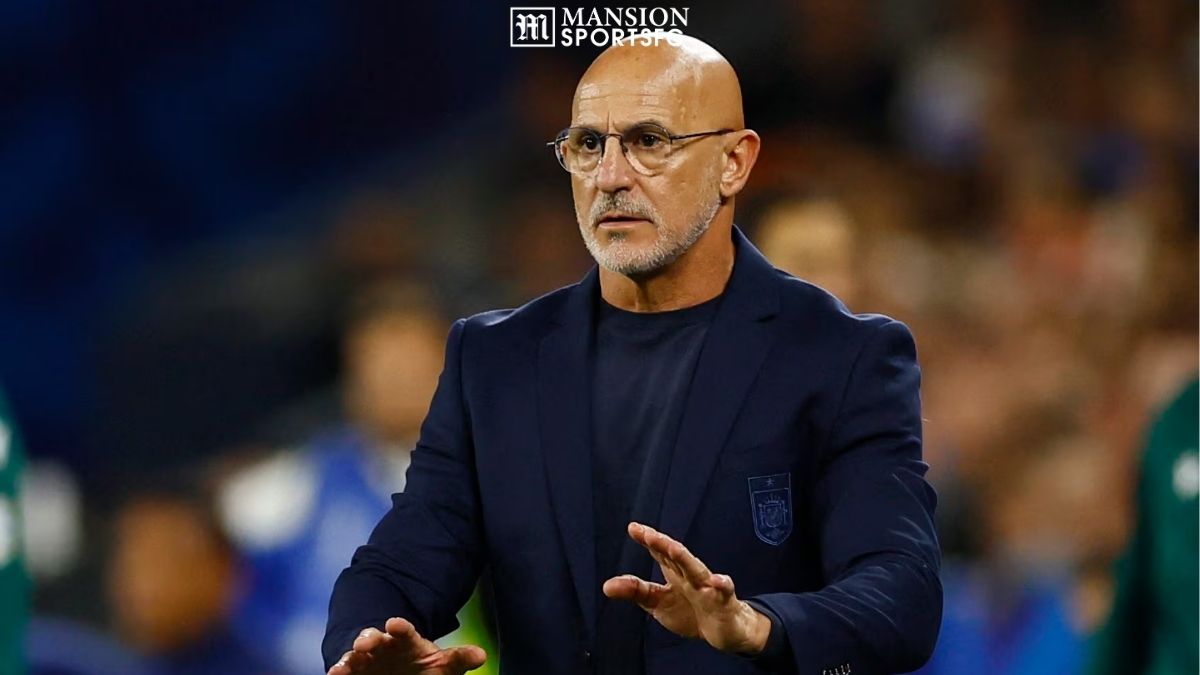
Luis de la Fuente Faces Renewed Criticism After Lamine Yamal’s Injury
Mansion Sports – Spain’s national team coach, Luis de la Fuente, has once again come under intense scrutiny following his controversial decision to play Lamine Yamal despite the Barcelona youngster not being fully fit.
Reports from Spanish media reveal that Yamal was allegedly fielded while still recovering from injury and had to rely on painkillers during the international break — a decision that ultimately aggravated his condition.
The incident has reignited debate over de la Fuente’s management approach, particularly his handling of young players, and drawn parallels to the serious injury suffered by Gavi under similar circumstances just a year ago.
Old Wounds Reopened: Barcelona’s Fractured Relationship with De la Fuente
The conflict between Barcelona and Spain’s national team coach has resurfaced sharply. In 2023, de la Fuente faced heavy criticism after Gavi tore his anterior cruciate ligament while playing for Spain against Georgia — an injury that sidelined him for nearly a year.
Instead of taking responsibility, the 63-year-old coach blamed Barcelona, then under Xavi Hernández, for overusing the player.
While it is true that clubs often push their players to the limit across long seasons, de la Fuente’s defensive attitude and lack of empathy have consistently drawn ire.
He continues to portray himself as a victim of criticism, even as his own decisions — such as fielding players who have not fully recovered — worsen their physical conditions.
Lamine Yamal Becomes the Latest Victim
The latest case involving Lamine Yamal appears to follow the same troubling pattern. After his injury relapse, Barcelona head coach Hansi Flick openly criticized Spain’s national team for its handling of the 17-year-old prodigy. Flick stated bluntly that “Spain did not protect Lamine properly.”
Rather than reflecting on the criticism, de la Fuente lashed out, accusing Flick of “lacking empathy.”
His reaction has further reinforced public perception that he is unwilling to take accountability for the physical toll his decisions impose on players — especially on emerging talents like Yamal, Gavi, and Pedri.
A History of Risky Decisions
De la Fuente’s questionable management style is not new. During the Tokyo 2020 Olympics, he selected multiple players who had already endured a grueling summer at the UEFA Euro 2020.
The likes of Pedri, Dani Olmo, Mikel Oyarzabal, and Gavi were pushed beyond their limits, leading to fatigue and a noticeable dip in performance that some have yet to recover from.
His latest justification for playing Yamal was that Spain faced “two crucial World Cup qualifiers.” However, this reasoning appears weak given that Spain had already recorded emphatic victories — scoring nine goals and conceding none — against relatively weaker opponents such as Georgia, Turkey, and Bulgaria.
Spain’s deep squad, especially in midfield, offered plenty of alternatives. While Yamal’s creativity is exceptional, risking an injured teenager for low-stakes qualification matches is widely regarded as an irresponsible choice.
Lessons Still Unlearned
When Gavi suffered his devastating injury in 2023, Spain had already secured qualification, yet de la Fuente still played him for a full 90 minutes against Cyprus — his seventh appearance in eight qualifiers.
The fact that history has repeated itself with Yamal suggests the coach has failed to learn from past mistakes.
Allowing a teenager to compete under the influence of painkillers in a non-essential match is not only reckless but also shows a troubling disregard for the long-term well-being of young players.
This pattern underscores a coach’s ego-driven focus on short-term results at the expense of player health and career longevity.
Responsibility and Ethics in Modern Football
In any professional field, the safety and health of workers should take precedence. Unfortunately, football often neglects this principle.
Player unions have long warned about excessive fixture congestion and the mounting risk of injuries due to fatigue.
Yet governing bodies such as UEFA and FIFA continue to expand competitions, prioritizing profit over player welfare.
While the broader issue lies with football’s governing structures, this does not absolve coaches like de la Fuente of responsibility.
Ignoring the physical and developmental impact of overplaying young athletes is both ethically and professionally indefensible.
Clubs Begin to Push Back
An increasing number of clubs are now resisting what they view as reckless international management.
Paris Saint-Germain, for example, has threatened legal action after both Désiré Doué and Ousmane Dembélé returned injured from international duty. The French club accused national federations of lacking transparency and communication.
A similar stance appears to be brewing at Barcelona, which has already lost several key players due to mishandled international call-ups.
Trust between the Catalan club and de la Fuente has eroded to the brink of collapse. Analysts have likened the situation to “a kindergarten teacher returning children to school injured.”
A Deepening Trust Crisis Between Barcelona and De la Fuente
The growing rift between Barcelona and the Spanish national team has reached its lowest point under de la Fuente’s tenure.
The Catalan giants feel betrayed after repeatedly seeing their young talents sidelined by injuries linked to questionable national team decisions.
As public and media pressure mounts, a pressing question now looms over Spanish football: How long must young stars continue to suffer the consequences of managerial negligence?
If no change occurs, the future of Spain’s so-called “golden generation” may be jeopardized — not by a lack of talent, but by the misguided ambitions of a coach who prioritizes short-term glory over the well-being of his players.